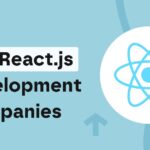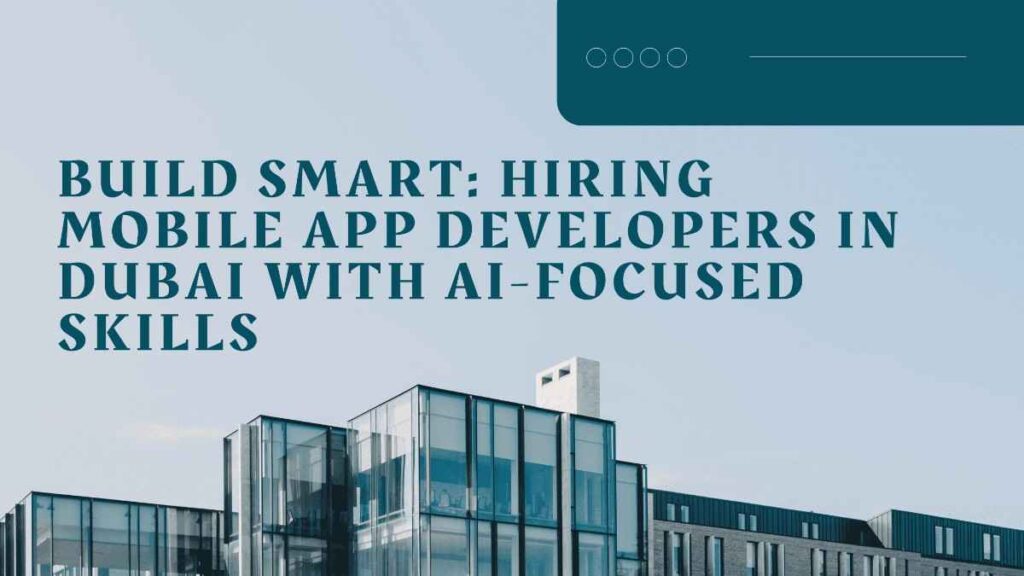You’ve probably heard it before: Dubai is going digital. But this isn’t just about paperless offices or contactless payments. This is about building a smart economy where mobile technology is the beating heart—and Artificial Intelligence is its nervous system.
Every day, businesses in Dubai are being pushed into a future shaped by data, personalization, and automation. Mobile apps? They’re no longer just a convenient interface. They are now AI-powered assistants, virtual storefronts, and real-time insight engines. If you’re building a mobile app in Dubai, hiring the right developer isn’t a nice-to-have—it’s everything.
Why Dubai Is the New Epicenter for AI-Driven Mobile Innovation
Let’s get something straight: Dubai didn’t stumble into tech stardom. The emirate planned it—strategically, aggressively, and with long-term vision. From the UAE’s National AI Strategy 2031 to the Smart Dubai initiative, the city has been laying tracks for a future that demands not just digital literacy, but AI fluency.
Mobile apps sit right at the center of this shift. Whether it’s government services, banking, real estate, or logistics—there’s an app for it. But today, these apps are expected to be smarter. Predictive search, behavioral analytics, conversational interfaces—these aren’t bonus features anymore. They’re table stakes.
That’s why the hiring market has shifted. Companies aren’t just looking for coders. They’re looking for mobile app developers who can architect AI-first experiences.
What Makes a Developer “AI-Focused”?
Let’s clear the air. AI-focused doesn’t mean someone who can talk about ChatGPT at dinner parties. It means developers who understand how to integrate machine learning models into mobile frameworks. It’s about being able to:
-
Work with Core ML, TensorFlow Lite, or ML Kit
-
Optimize AI features for low-latency, on-device execution
-
Collaborate with data engineers and AI modelers to create usable outputs
-
Understand the nuances of privacy and bias in mobile AI features
And here’s the clincher: They know how to make AI invisible. Good AI in mobile is subtle, contextual, and user-friendly. It doesn’t scream “algorithm.” It whispers convenience.
The Current Talent Landscape in Dubai
Dubai’s tech scene is dynamic—but let’s not pretend it’s a utopia. While the market is rich with talent, AI-focused mobile developers remain a niche group. And with high demand coming from finance, logistics, tourism, and government sectors alike, the supply chain is getting tight.
That said, there’s an upside: Dubai attracts international talent. Many developers here are not only experienced in cross-platform frameworks like Flutter and React Native but are also dabbling in AI-powered user personalization, chatbots, and real-time analytics.
But finding them is less about trawling LinkedIn and more about knowing what to ask—and what to ignore—in a hiring interview.
Red Flags to Watch When Hiring AI-Focused Developers
You’d be surprised how often buzzwords outpace capability. Here’s what you don’t want to hear:
-
“I’ve played around with AI APIs.”
-
“We added a chatbot to our app, so I know AI.”
-
“I watched a course on Udemy last month.”
Instead, you’re looking for:
-
Hands-on experience deploying machine learning models into production
-
Projects that demonstrate personalization, smart automation, or predictive behavior
-
A GitHub repo (or three) that shows real work—not just forked libraries
In short: less talk, more tools.
How to Interview for AI-Focused Skills Without Being an AI Expert
You don’t have to be a data scientist to screen for AI capability. Ask targeted, experiential questions like:
-
“How have you optimized an AI model for mobile performance?”
-
“Tell me about a time your AI feature failed in production. What did you do?”
-
“How do you manage model updates without bloating app size?”
A strong candidate won’t just answer. They’ll explain. They’ll take you into the problem, unpack the trade-offs, and walk you through their reasoning. That’s your sign.
Understanding the AI Integration Workflow
Here’s a quick cheat sheet to help you understand what AI integration actually looks like in a mobile dev workflow:
-
Model Selection – Is it an existing model (e.g., Google’s TFLite) or a custom-trained one?
-
Model Conversion – Turning a model into a format suitable for mobile use
-
On-Device Optimization – Reducing size, increasing speed, preserving battery
-
Privacy Handling – Ensuring GDPR and local data laws are respected
-
UX Calibration – Making sure AI output actually helps the user
If your prospective hire can speak to this process, you’re in good shape.
Why AI-Native Mobile Apps Matter More Than Ever
There’s a reason the market is shifting. Today’s users expect:
-
Apps that predict rather than respond
-
Interfaces that adapt to their habits
-
Recommendations that feel personal—not creepy
In retail, this means dynamic pricing and personalized offers. In health, it means proactive monitoring. In travel, it means intuitive itinerary suggestions. The future of mobile is anticipatory—and you need a developer who can deliver on that.
Cost Realities: What AI-Ready Developers Command in Dubai
Let’s talk money. You’re not hiring just a mobile dev—you’re hiring a strategist, an AI interpreter, and a UX advocate rolled into one.
Expect to pay:
-
Mid-Level AI-integrated Mobile Developer: AED 18,000–25,000/month
-
Senior AI Mobile Architect: AED 30,000–45,000/month
-
Specialized Freelancers: AED 150–350/hour (depending on portfolio and AI complexity)
Yes, it’s a premium. But so is irrelevance. And in a fast-moving market like Dubai, that cost comes quicker than you think.
Agency vs In-House vs Freelance: What’s Best?
This depends on your roadmap:
-
In-House: Great if you’re building a core product and need long-term AI alignment
-
Freelancers: Perfect for adding one smart feature, fast
-
Agencies: Best for businesses that want end-to-end AI-enabled mobile development without building internal infrastructure
Just make sure any agency you hire can show—not just say—its AI credentials.
Building a Hiring Funnel That Filters for AI Talent
Here’s a smart way to structure your hiring funnel:
-
Pre-screen Questions: Focus on AI experience, not fluff
-
Technical Test: A basic ML model integration task (lightweight, time-bound)
-
Portfolio Review: Dig into real work, not just mockups
-
Interview: Stress problem-solving and communication over theoretical depth
Hiring AI talent isn’t just a test of their skills—it’s a test of your clarity. Be specific about what you need, and your funnel will filter the rest.
The AI Ethics Factor
AI in mobile can be powerful—or dangerous. Your developer must understand fairness, explainability, and user consent. Especially in Dubai’s regulated sectors (finance, health, govtech), this matters more than most realize.
Ask your candidates:
-
“How do you prevent model bias?”
-
“How do you handle data retention?”
-
“What’s your approach to AI transparency in UX?”
If they look confused, keep looking.
Final Thoughts: Smarts Before Speed
We get it. You’re in a hurry to ship. But hiring the wrong developer can be more expensive than waiting. In an AI-driven mobile future, speed is nothing without intelligence. You want people who get the landscape, understand the nuances, and can build with both foresight and precision.
Dubai is ready. The infrastructure is in place. The policies are favorable. The user base is tech-savvy. All that’s left is for you to build smart—and that starts with hiring smart.
Looking to leap ahead? Explore mobile app development services in Dubai that prioritize intelligent design, agile build cycles, and AI-forward thinking. That’s where the future’s already being written.
- Build Smart: Hire AI-Focused Mobile App Developers Dubai
- Hire mobile app developers in Dubai with AI-focused skills to create smarter, cutting-edge apps that drive innovation and growth.
- mobile app development services in Dubai
Related posts:
 Top 5 Custom Software Development Companies in Edmonton 2025
Top 5 Custom Software Development Companies in Edmonton 2025
 Best ReactJS Development Companies for Scalable Web Apps in 2025
Best ReactJS Development Companies for Scalable Web Apps in 2025
 Find the Best Grocery Delivery App Development Company for Startups
Find the Best Grocery Delivery App Development Company for Startups
 Contrast Mapping for Dark Mode Accessibility in Taxi Booking Apps
Contrast Mapping for Dark Mode Accessibility in Taxi Booking Apps
 Boost Your Business with These App Development Companies in Kuwait
Boost Your Business with These App Development Companies in Kuwait
 How to Block Someone on TikTok: A Simple Guide That Works in 2025!
How to Block Someone on TikTok: A Simple Guide That Works in 2025!
 Transforming Ideas into Apps: Appicoders, Houston’s Mobile Innovation Hub
Transforming Ideas into Apps: Appicoders, Houston’s Mobile Innovation Hub
 Why Technical Feasibility Studies Save Millions in Tech Development
Why Technical Feasibility Studies Save Millions in Tech Development







